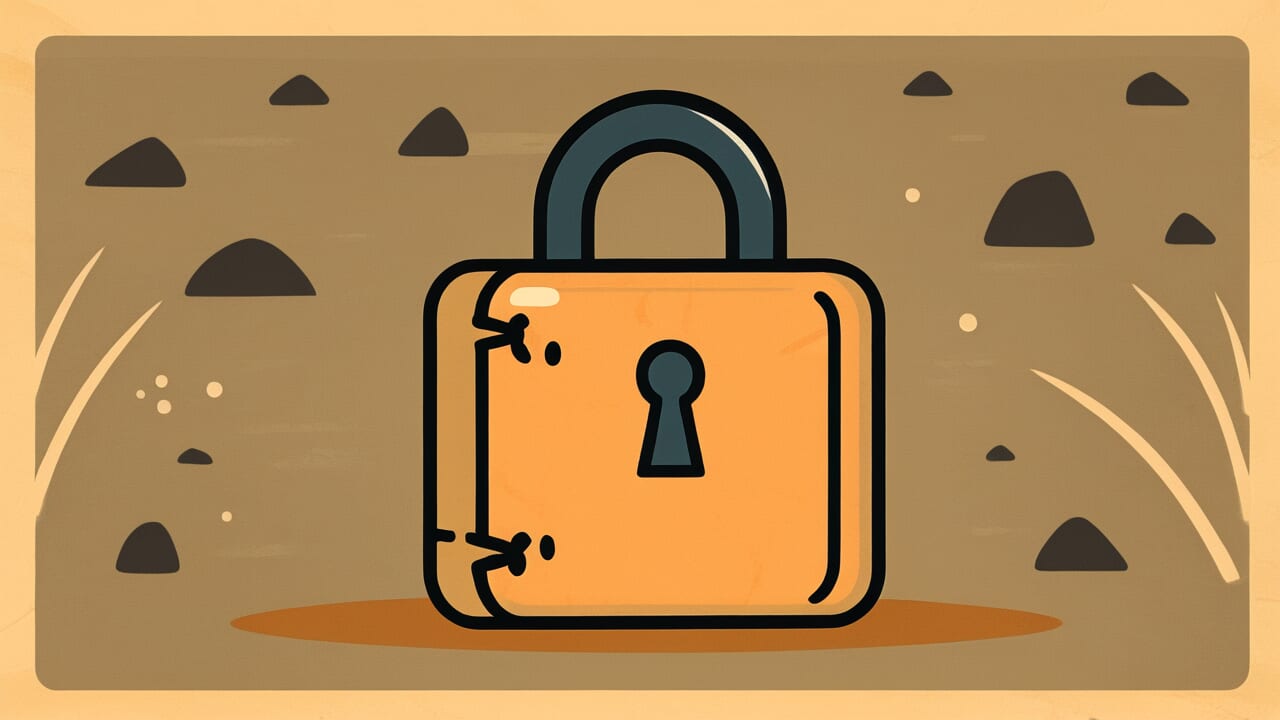How to Read “A lock on a stone”
Ishi ni jō
Meaning of “A lock on a stone”
“A lock on a stone” is a proverb that describes completely meaningless actions, like putting a lock on an immovable stone.
It criticizes actions where people focus on appearances while ignoring the actual purpose or effect.
This proverb is used when someone makes pointless efforts because they’re stuck on customs or formalities.
For example, adding excessive security to something already safe, or following unnecessary procedures when they serve no purpose.
Even today, people often lose sight of what matters and obsess over formalities.
Using “A lock on a stone” clearly points out how meaningless such actions are.
However, it’s a strong expression that denies someone’s efforts, so you need to be careful when using it.
When you use it to reflect on your own actions, it can lead to calm self-analysis.
Origin and Etymology
The origin of “A lock on a stone” has no clear historical record.
However, the meaning becomes obvious when you look at how the phrase is constructed.
A stone represents something immovable in nature. Even if someone tries to carry it away, its weight makes that nearly impossible.
Meanwhile, locks have been used since ancient times to protect valuables and precious things.
On doors, on boxes, on storehouses. People gained peace of mind by locking what they wanted to protect.
But what does it mean to put a lock on a stone?
Deliberately locking a heavy stone that no one could carry away anyway. This action has no practical benefit whatsoever.
Whether you lock it or not, the stone will stay right there.
This expression likely came from sharp observation of human behavior.
In the world, there are actions that seem reasonable at first glance but are completely meaningless when you think about them.
Being satisfied with just arranging the formalities. Obsessing over methods while losing sight of the essence.
“A lock on a stone” captures this human foolishness in a simple phrase.
The structure of the words itself eloquently tells the story of its meaninglessness.
Usage Examples
- Security is important, but installing surveillance cameras in the back room of a warehouse nobody visits is like a lock on a stone
- Perfectionism is fine, but isn’t adding more checks when it’s already sufficient like a lock on a stone?
Universal Wisdom
“A lock on a stone” shows deep insight into the human tendency to overdo things.
Why do people do more than necessary?
Behind this lies the emotion of anxiety. Even when something is truly sufficient, the fear that “maybe it’s not enough” drives people to meaningless actions.
The stone will stay there, yet they still can’t help but lock it.
This psychology resonates with modern people too.
Excessive attachment to formalities also can’t be overlooked. Humans are social creatures, so we value norms about “how things should be done.”
However, these norms sometimes drift away from their original purpose, and only the form continues on its own.
People forget the essence of why they do something and act simply because “that’s how it’s done.”
This proverb has been passed down through generations because these human tendencies never change across time.
Even in modern society that seeks efficiency, meaningless customs and excessive measures never end.
Our ancestors understood that humans easily lose sight of what’s essential.
By expressing this foolishness in the simple phrase “A lock on a stone,” they give us a chance to stop and think.
When AI Hears This
Analyzing the act of putting a lock on a stone thermodynamically reveals a striking asymmetry.
Making a lock requires mining iron ore, refining it at high temperatures, and processing it into complex mechanisms.
During this process, enormous energy dissipates as heat, and the disorder of the entire universe—entropy—definitely increases.
Yet the stone being locked was never going to be taken by anyone anyway.
In other words, the “work” produced by this highly ordered device called a lock is zero.
According to the second law of thermodynamics, using energy to create order always has a cost.
Just as a refrigerator cools its interior while releasing heat from the back, local ordering always creates greater disorder in the surroundings.
When putting a lock on a stone, no change occurs in the stone system, so no value is created to match the entropy increased by manufacturing and installing the lock.
This is a complete loss in the universe’s ledger.
Even more interesting is the relationship with time’s arrow.
The lock rusts and deteriorates over time, eventually returning to a state indistinguishable from the stone.
In other words, the order artificially created naturally collapses, and entropy continues to increase.
The act of putting a lock on a stone temporarily tries to resist this irreversible flow, but ultimately only accelerates it.
Lessons for Today
“A lock on a stone” teaches us the importance of having the courage to stop and ask, “Is this really necessary?”
We’re chased by various jobs and tasks every day.
Among them might be meaningless work we continue only because it’s customary.
Meetings for the sake of meetings, reports just for form, creating materials no one reads. Are these really necessary?
This proverb offers hints for improving efficiency. Before starting something, clarify its purpose.
Then calmly judge whether the method truly contributes to achieving that purpose.
If it doesn’t contribute, it’s “A lock on a stone.” You need the courage to stop doing it.
However, this proverb doesn’t preach simple efficiency above all.
What matters is having eyes that can discern the essence.
Some actions that seem wasteful actually hold important meaning. Conversely, some actions that seem important actually have no effect.
Look back at your daily life. Are you seeking superficial peace of mind and making meaningless efforts?
To devote your time and energy to what truly matters, cultivate eyes that can identify “A lock on a stone.”



Comments